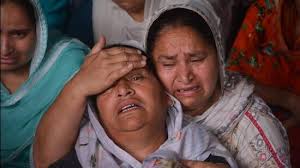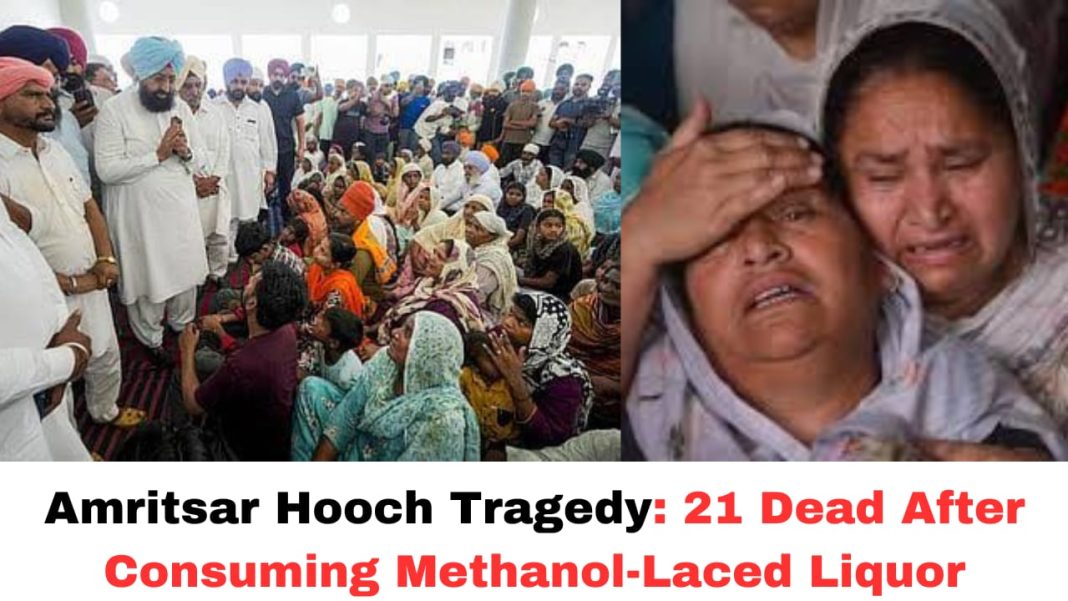Digital News Guru Punjab Desk:
On the night of May 12, 2025, a devastating tragedy unfolded in the Majitha block of Amritsar district, Punjab, where at least 21 people have died and several others are hospitalized after consuming toxic, methanol-laced liquor. The victims hailed from villages including Bhangali, Patalpuri, Marari Kalan, and Therewal in the Majitha block. This incident has once again highlighted the persistent issue of illicit liquor production and consumption in India, raising concerns about public health and safety.
Inside the Amritsar Hooch Tragedy: Methanol Poisoning Leads to 21 Deaths
The tragedy occurred across multiple villages in the Majitha block, including Bhangali, Patalpuri, Marari Kalan, and Therewal. According to police investigations, approximately 50 liters of methanol—a highly toxic chemical—were diluted to produce around 120 liters of illicit alcohol. This concoction was then distributed across five villages, leading to widespread poisoning. At least 21 people have died, and six others are currently receiving treatment at the Civil Hospital in Amritsar.

Arrests and Official Response
Authorities have arrested nine individuals, including the alleged kingpin of the operation. Notably, the methanol used was reportedly procured online. In response to the tragedy, the Deputy Superintendent of Police and the Station House Officer of Majitha have been suspended for negligence.
In the aftermath of the incident, authorities have arrested nine individuals, including the alleged kingpin of the operation. Notably, the methanol used was reportedly procured online. Punjab Chief Minister Bhagwant Mann has condemned the incident, labeling the deaths as “murders” and vowing strict action against those responsible. He announced a compensation of Rs 10 lakh for the families of the deceased.
Political Fallout
The tragedy has sparked political controversy, with opposition parties accusing the Aam Aadmi Party-led state government of failing to control the illicit liquor trade. Calls for the resignation of Chief Minister Mann and Excise Minister Harpal Singh Cheema have been made by various political leaders.

Broader Context
This incident is the third major hooch tragedy in Punjab over the past five years. In 2020, over 120 people died in a similar incident, and in 2024, 24 deaths were reported in Sangrur due to spurious liquor consumption. The state government has pledged a comprehensive crackdown on the illicit liquor network to prevent such tragedies in the future.
Conclusion
The recent hooch tragedy in Amritsar’s Majitha block, which has claimed at least 21 lives and left several others hospitalized, underscores the persistent and perilous issue of illicit liquor consumption in India.
This incident is not isolated; Punjab has witnessed similar tragedies in recent years, including the deaths of over 100 individuals in 2020 and 24 in 2024 due to spurious liquor.
The state’s response, including arrests and suspensions of officials, indicates a recognition of the severity of the problem.
However, to prevent such incidents, a multifaceted approach is essential. This includes stringent enforcement of laws against the production and distribution of illicit liquor, public awareness campaigns about the dangers of consuming unregulated alcohol, and providing affordable, safe alternatives to deter individuals from resorting to hazardous options.
Community engagement and education can play a pivotal role in identifying and reporting illegal activities, thereby aiding law enforcement efforts.

The Amritsar tragedy serves as a grim reminder of the human cost of neglecting these measures. It is imperative for authorities, communities, and individuals to collaborate in eradicating the menace of illicit liquor to safeguard public health and prevent further loss of life.
The Amritsar hooch tragedy serves as a grim reminder of the dangers posed by the illicit liquor trade in India. It underscores the urgent need for stringent enforcement of laws, public awareness campaigns, and community engagement to prevent such incidents. As investigations continue, it is imperative for authorities to take decisive action to dismantle the networks responsible and to implement measures that safeguard public health and safety.
You May Also Read: E-Passports in India: What Travelers Need to Know About the New System








